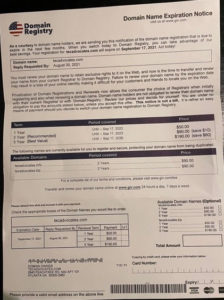What Are Domain Scams?
While new and exciting web content is being created, discovered, and shared daily, new scams are plaguing users increasingly, all while becoming more convincing. Domain scams are on the rise. It was once a scam that was only done via mail. However, scammers are finding ways through data leaks, phishing, and other nefarious methods to obtain email addresses and send scams directly to your inbox.

False Renewal Notices

For most businesses, websites are critical to operation and well-being. Your domain name is your website’s identity, and you must pay a renewal fee to maintain ownership of it. You can purchase domain names on several different websites, and once you have one, you can develop your website using that domain name. Websites where you can acquire a domain are called registrars, such as GoDaddy.
Domain name renewal is typically a simple process, but it is becoming increasingly difficult due to scammers becoming more manipulative. They are creating fake mailings and emails designed to trick an unwitting victim into paying them a “renewal fee” for the domain name, even though they have zero affiliation with you, your website, your domain, or any legitimate business.
If a victim pays the scammer, not only has money essentially been stolen from them, but the scammers will then likely sell their information to other scammers for future use.
Transferring Your Domain to Them
Some scammers have taken the scam one step further by charging a renewal and requesting additional information from the victim to transfer the domain to them. This fee may be through “renewal forms” or other similar types of documentation that they would require you to fill out. Scammers then gain complete control over your website, including your company email, store, and personal information of employees and clients.
The Domain Scam Tactics
Scammers often use bold words like “URGENT” or “IMPORTANT” to incite fear in the victim. Many business owners are not 100% familiar with the tech side of their company and instead hire internal or external IT to operate their website and other technical aspects of their business. If someone unfamiliar with technology receives a letter from what seems to be a legitimate company stating their website will go down, they are likely to comply with the letter to avoid any issues.
Scammers succeed – by inducing fear, creating a fake problem that appears to be urgent, and then stealing money and information from their victims.
Ways to Protect Yourself from a Domain Scam
Suppose you receive a seemingly legitimate letter, email, or phone call from a company where you do business. Contact that company directly instead of using the phone number given to you. For example, if you receive a letter stating your domain name is about to expire. It requires urgent attention; contact someone you know from the company directly, or visit the company website and use the phone number listed there. You will often find that they have not sent you anything and that there are no issues with your account.
Another way you can prevent scammers from taking advantage of you is to communicate with your peers. If you receive an urgent email, always ask your IT department, friends, family, or coworkers before proceeding. It is likely that someone has already encountered the same scam and can steer you away. Scammers prey on miscommunication or a lack of communication. They want you to focus on the “urgent issue” and not speak to anyone else.
Always be cautious with all incoming correspondence. Assume that everything is a scam until proven otherwise. Look out for words like URGENT, REQUIRES IMMEDIATE ATTENTION, and IMPORTANT. These words strike fear into victims and cause them to think less critically.
Do you have questions or concerns about a scam? Then contact TecAdvocates.
